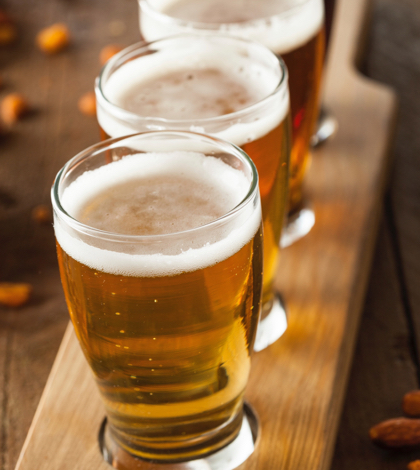Bottoms Up!
We’re all familiar with the current focus and tactics for conserving water — restrictions on lawn watering, prohibitions for hosing down your driveway, and making it illegal for restaurants to refill your water glass unless you specifically ask.
But what about craft beer made with recycled waste water or gray water as it’s also known? Gray water is defined as treated water previously used in sinks, showers, dishwashers or washing machines but not from toilets.
Architect Russ Drinker approached Half Moon Bay (CA) Brewing Company owner Lenny Mendonca in 2014 asking to highlight beer popularity and potential solutions to the state’s ongoing drought. Mendonca was willing and Mavericks Tunnel Vision India Pale Ale (IPA) was born.
(For the non-drinking population IPAs refer to beer that is bitter and highly alcoholic. It was as a result of the extreme temperatures and prolonged storage of beer, without the benefit of refrigeration, during the British colonization of India. Two alternatives existed to resolve the problem–alcohol and hops; both worked as preservatives. Legend indicates George Hodgson of East London’s Bow Brewery created the first IPA that could make the long ocean trip. Today’s IPAs are characterized by an abundance of hops.)
NASA used water recycling technology aboard the International Space Station with astronaut Scott Kelly to treat his urine and sweat (along with traditional gray water) to recycle about 93 percent of the ISS water into safe, usable water. The ISS’s water recycler uses a distiller that looks like a keg. On Earth, distilling is a simple process of boiling water and cooling the steam back into pure water. But without gravity, the contaminants in water never separate from the steam no matter how much heat is used. So, the keg-sized distiller spins to produce an artificial gravity field while boiling the water. The contaminants in the urine, or greywater, press against the sides of the drum while the steam gathers in the middle and is pumped to a filter.
Using the NASA water recycling technology Drinker was able to create a beer that is slightly darker than the original Mavericks Tunnel Vision beer made with traditional Bay Area municipal water.
”This is the product [where] people think that water is the most important ingredient,” Mendonca told the Guardian. “so if I can demonstrate to people that not only is [gray water beer] good, but it’s great, then why wouldn’t you use that water for everything else?”
Drinker echoed Mendonca’s comments and highlighted the conservation efforts saying, “if Californians really want to have an impact on our water use, we have to recycle our fresh water … and get over our psychological resistance to that.”
In a blind taste test people couldn’t tell the difference between the gray water version and a traditional version of IPA, Mendonca said. Thus far the beer has been sampled twice and the brewery has several other tasting events planned including March 23 at the Silicon Valley Water Conservation Awards event at Google and the June IDEAS conferences in Los Angeles.
But don’t expect it to be sold commercially in your favorite liquor store anytime soon.
A spokeswoman for the Half Moon Bay Brewing Company says that though the beer has the potential to be commercially successful, Mendonca’s focus is to use the beer as a tool to educate the public. But, because it is illegal to directly pump treated recycled water back into the drinking water supply in California, it is currently neither practical nor cost effective to produce recycled water beer.
Getting legislation to bring recycled water directly into the drinking water supply has prompted the brewery to reach out to California State Assemblyman Rich Gordon for assistance in the use of recycled waste water for educational and commercial purposes.
 California Water News Daily Your Source For Water News in California
California Water News Daily Your Source For Water News in California


